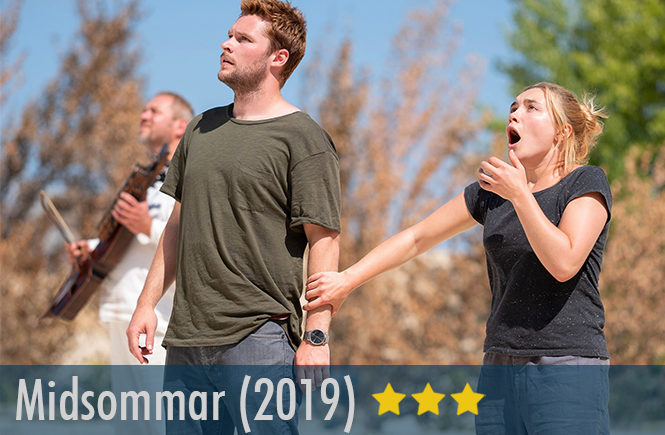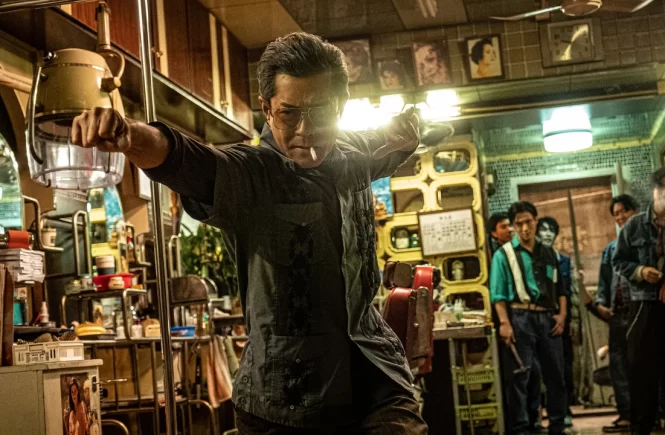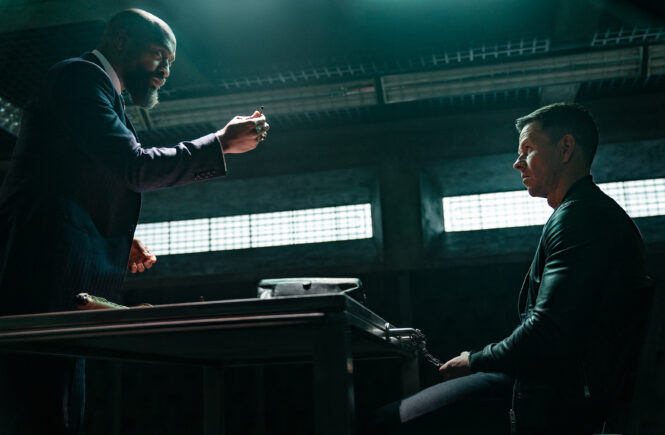“Midsommar”, the highly anticipated second film from director Ari Aster proves once again the filmmaker’s acute sense of place and extreme attention to detail. This is a film bathed in unspoken symbols and vivid legends; and through drawings, paintings and carvings these images pervade a large part of the film, foretelling much of what it is to come and adding a sense of environment that is at once sacred, beautiful and horrifying.
When considering the main story and themes involved, “Midsommar” plays much like the director’s excellent previous film, “Hereditary”. Both the main protagonists undergo a terrible loss, experience immersible grief and alienation, eventually turning to occult means to feel whole again. Though “Midsommar”, on the surface, deals with the collapse of a relationship, it is much more about loosing your sense of place and family in the world, and then eventually finding it again. And similarly, as in “Hereditary”, many of the events in this film are foretold to occur or set-up.
However, though the film may resemble “Hereditary” thematically, visually this is an entirely new ballpark for Aster. There are sweeping vistas and open spaces which are a direct contrast to the tight, closed off environments that pervade “Hereditary” and most other horror films. “Midsommar” is colorful and bright for most of its run-time, which is something that you don’t expect a horror film like this to do. It also seems a little odd to call this a horror film because it inst really scary or frightening in the conventional sense, but is more mysterious and psychologically intense. Which I loved. You can feel Aster pushing the boundaries of not only what he is capable of, but also of what horror might be capable of.
That being said, this film doesn’t feel as refined and masterful as “Hereditary” was. Aster is someone who knows what he is doing behind the camera, and the film is gorgeous and visually complex, but the characters in the film aren’t as well fleshed out. What was so great about his previous film was that it never lost sight of the personal grief of the characters and when the supernatural elements occurred, you could still understand each of the characters perspectives clearly. In “Midsommar”, the situation feels flipped, it often seems as though the supernatural elements of the film overshadow the stories of the characters, which I was a little disappointed with especially since some of the images and rituals we are presented with are not as impact-full as they should have been.
“Midsommar” really delves into the folklore behind the cult we are introduced to, and I loved the little things we learned, I loved the environment that was created and all, but it also felt like something I had seen before. It felt a lot like “The Wicker Man”, which is another horror film set mostly outside, featuring occult rituals. I tried to not make too many comparisons to that film, but after a certain point I really couldn’t help but notice how similar the two films were. They both employ similar iconography, costumes and rituals, which I assume are inherent to the Swedish location they are both set-in. Which is fine; however, my issue is that the images and rituals that we encounter sometimes don’t carry the power that they should have because it was something I had already seen. This is not to say that what Aster presents us with is not good, on the contrary it is expertly presented and is wonderful to watch, but it struggled to stay with me after I left the theater. There is enough weird, occult rituals and phenomena to satisfy most of the people that go into this movie, but it never left an impression on me.
There is a wonderful dream sequence which happens in the middle of the film, where Dani imagines Christian and his friends leaving her behind, she is in disbelief and then clouds of black smoke appear from her mouth mimicking the earlier scene when her family had died. It’s eerie, brilliant, and adds volumes to the disconnect between Dani and Christian, as well as the other people she came with without saying a word, and at the moment I couldn’t help but feel horrified but also extremely sorry for Dani. It’s scenes like these which remind me of just how great Aster is, and I wished he focused more on elements like that which directly tie into his character’s emotions rather than delving so deeply into the Swedish mythology.
I have heard of a director’s cut coming out which claims to feature more scenes with Dani and Christian, and I am certainly going to watch it; however, I’ve also heard it adds about 20 minutes of new material to the film which I am a little apprehensive about because this film already feels too long. Though I enjoyed the fact that this was a slow-burn film, there are certain subplots which don’t really go anywhere. There is this whole thesis conflict between Christian and Josh, which looking back on was a little pointless. Again, I wish the film was a little more focused on Dani and her relationship with Christian, there is a lot to unpack there, like Dani’s possible mental illness and depression, and I wish it went deeper than it did. Especially considering the amazing performance that Florence Pugh gives, she is absolutely astonishing as Dani and I was with her all the way through. Aster certainly has an eye for strong female leads, and Pugh delivers a complex and heart wrenching performance.
At the end of the day though, I really enjoyed myself watching “Midsommar”, it was intriguing and the imagery was fascinating, but I was a little disappointed with the way the characters were handled considering this was a film from the director of “Hereditary”, a film that understood it’s environment and characters so well. Nevertheless, I’m hooked onto Aster and I am eagerly anticipating whatever he has in store for us next, which I read in an interview might not be another horror film. Exciting!




